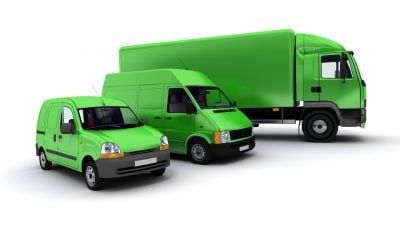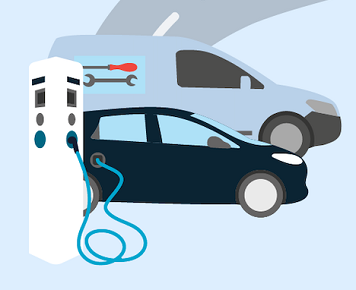We all know that the impact that motor vehicles have on the environment is huge, and the need to be more sustainable and environmentally friendly is ever-present.
 By 2030, new cars and vans powered wholly by petrol and diesel will not be sold in the UK in a bid to encourage and accelerate the use of electric vehicles. Because of this, we are seeing more and more companies realigning themselves by making strides towards greener fleets, particularly in the deliveries space. Whilst we see industry giants like DPD and Amazon are leading the way in replacing diesel and petrol delivery vans with electric vehicles, implementing a greener fleet isn’t just for big businesses with a ‘green’ agenda. Small- to medium-businesses, who tend to think there are no easy solutions for their business, can also benefit in a considerable way.
By 2030, new cars and vans powered wholly by petrol and diesel will not be sold in the UK in a bid to encourage and accelerate the use of electric vehicles. Because of this, we are seeing more and more companies realigning themselves by making strides towards greener fleets, particularly in the deliveries space. Whilst we see industry giants like DPD and Amazon are leading the way in replacing diesel and petrol delivery vans with electric vehicles, implementing a greener fleet isn’t just for big businesses with a ‘green’ agenda. Small- to medium-businesses, who tend to think there are no easy solutions for their business, can also benefit in a considerable way.
It’s also not just the environment that benefits from greener fleets, there are huge advantages from a business point of view too. Implementing a greener fleet can save businesses money on taxes as well as reducing fuel costs. However, keeping up to date with current legislations and understanding things such as which fuels are banned, Clean Air Zone regulations and meeting emissions standards are all areas which need to be considered.
The good news is, there are simple things that businesses can do, to improve the environmental impact of their fleet, that are easy to implement and will have an immediate impact.
GPS tracking to boost sustainability
By far, the easiest way to manage your fleet would be through GPS reporting. Installing a GPS tracker into each vehicle within the fleet could generate real-time data on aspects such as location, vehicle performance and mileage.
And it is the data that is of real value to your business in moving to as green a fleet as possible. While you may understand the importance of tracking your vehicle fleet, it may not always be clear how to use that data. GPS Reporting should be a benefit to your fleet manager, not a burden. The first place to start is to ask yourself what are the most important factors impacting your company when it comes to ensuring it runs as environmentally friendly as possible?
Below are three places to start:
- Abiding by clean air zone regulations
 Clean air zones (CAZ) are areas where action is being taken to improve air quality. These areas could be entire cities or individual streets. CAZs have already been introduced in cities such as Bath, Birmingham and London, and work is well underway for rollout across more major cities in the UK. It’s important to prepare your fleet accordingly to ensure compliance for the new regulations.
Clean air zones (CAZ) are areas where action is being taken to improve air quality. These areas could be entire cities or individual streets. CAZs have already been introduced in cities such as Bath, Birmingham and London, and work is well underway for rollout across more major cities in the UK. It’s important to prepare your fleet accordingly to ensure compliance for the new regulations.
Some fleet management tools make it easier to abide by CAZ regulations. Look for one with route planning functionality that will allow you to examine each vehicle’s route and make adjustments so CAZs can be avoided next time round.
You could also look into an option that provides geo-fencing, meaning you’ll be notified when one of your vehicles enters a CAZ in real-time.
- Cutting your fuel consumption
 One of the primary ways fleet tracking systems promote a green fleet is by reducing fuel consumption. By using GPS trackers, you will be able to optimise routes and make changes to routes to limit drive times, reduce idling times and decrease turnaround times by providing customers with more accurate ETAs. An efficient fleet does not waste fuel, and by monitoring vehicles in this way will result in a reduction in fuel consumption, saving money and helping the environment, all at once.
One of the primary ways fleet tracking systems promote a green fleet is by reducing fuel consumption. By using GPS trackers, you will be able to optimise routes and make changes to routes to limit drive times, reduce idling times and decrease turnaround times by providing customers with more accurate ETAs. An efficient fleet does not waste fuel, and by monitoring vehicles in this way will result in a reduction in fuel consumption, saving money and helping the environment, all at once.
- Monitoring regulations
One of the most challenging aspects of managing a green fleet is adhering to ever-changing tax regulations. Fleet managers need to stay up to date on tax laws to ensure they’re saving money when possible and avoiding unnecessary fines at all costs.
 Taxes and regulations exist to control a variety of issues related to vehicle usage, such as Benefit-In-Kind (BIK) tax for electric company cars, vehicle emission standards and fuel duty costs – all designed to help benefit the environment and encourage greener habits when it comes to motoring.
Taxes and regulations exist to control a variety of issues related to vehicle usage, such as Benefit-In-Kind (BIK) tax for electric company cars, vehicle emission standards and fuel duty costs – all designed to help benefit the environment and encourage greener habits when it comes to motoring.
Here are just a few of the taxes and regulations that have been implemented most recently:
- BIK Electric Car Tax: The government has recently announced that company car drivers using a pure electric vehicle will pay just 1% for 2021/22, then 2% for 2022/23. There are two new BIK tables available, one for company cars registered before April 6, 2020 and one for company cars registered after that date.
- Ultra-Low Emission Zones: As of April 2019, London became the world’s first Ultra-Low Emission Zone (ULEZ). Petrol and diesel vehicles that do not meet the required emissions standards will be fined.
- Fuel Duty Freeze: UK fuel duty is 57.95 pence per litre for petrol and diesel. There has been a fuel duty freeze since 2011, but it may increase in upcoming months.
A route history documentation feature in your fleet tracking system, for example, will allow you to monitor vehicle mileage. This data can be used for tax purposes in addition to meeting internal goals surrounding fuel consumption, vehicle usage and more.
It is important that businesses of all sizes are consciously making decisions that help improve the environmental impact of their fleets. Using technology for vehicle tracking, means easy access to data and analytics that can help businesses of all sizes to take control of their environmental impact to ensure they, too, are doing their bit to reduce emissions and go green.
Author: Sam Rucker, industry expert and content creator at Vimcar
Vimcar works with SME businesses like Doherty Meats, Talk to a Doctor and Wright’s K9 Security. They are a customer-first and easy-to-use plug and play solution, who are keen to support UK SMEs, and have created an asset hub page where businesses and employers have free access to a wide variety of tools (such as templates, tax calculators and guides) to ensure they can best optimise their fleet.





